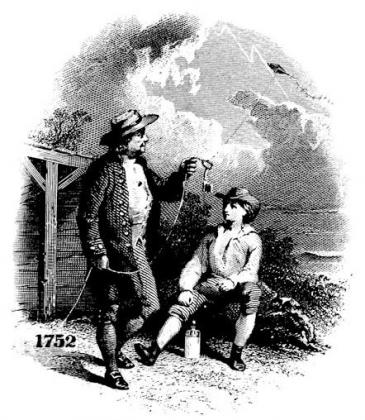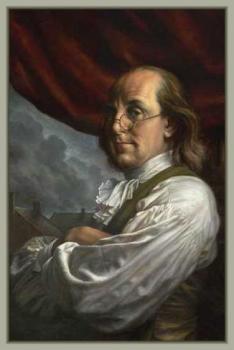A note on Benjamin Franklin's contribution to French secularism
Franklin's invention of lightning rods was interpreted in France as a symbolic blow against absolute monarchy and his proverbs for American farmers were greeted as moral instruction for the French masses – by revolutionaries, some clerics and, later, Napoleon.

Benjamin Franklin's discovery that lightning was merely electricity made him a hero in France. And in 1749 he applied this knowledge to invent the lightning rod. The French immediately grasped the social implications of this scientific advance.
They understood how freeing people from the fear of being struck down by lightning for their sins could help to loosen their dependence on a church which also supported political absolutism. As a contemporary noted:
You may distinguish the learned and the superstitious man when it thunders [...] "One seeks protection in sacred relics, the other in a lightning rod. [1]
 Franklin's discovery freed people from the fear of being punished by lightning and enabled them to take precautions to avoid it. However, in Bavaria, where some haven't heard of lightning rods, even in the 21st century, the Church still sells black "thunderstorm candles", Gewitterkerzen. These you light while you pray in fear to be spared from a lightning strike on your unprotected house.
Franklin's discovery freed people from the fear of being punished by lightning and enabled them to take precautions to avoid it. However, in Bavaria, where some haven't heard of lightning rods, even in the 21st century, the Church still sells black "thunderstorm candles", Gewitterkerzen. These you light while you pray in fear to be spared from a lightning strike on your unprotected house.
The Ancient Greek and Roman kings of the gods, Zeus and Jupiter, had also wielded thunderbolts against mankind. In 18th-century France referring to them was politically safe way of alluding to two contemporary absolute monarchs, the king and the pope. Thus French portraits of Franklin are often inscribed with a motto in Latin: "He snatched the lightning from heaven and the sceptre from tyrants" (Eripuit coelo fulmen, sceptrum que tyrannis).
And it was not just Franklin's scientific discovery that made him a hero in France. The French also found inspiration in his almanacs for American farmers. Franklin's homespun advice suggested a way to promote public morality without threatening divine punishment:
♦ "God helps them that help themselves." (1736)
♦ "A good example is the best sermon." (1742)
His Poor Richard's Almanac was full of maxims which showed the practical advantages of some traditional virtues:
♦ Temperance: To lengthen thy life, lessen thy meals. (1733)
♦ Charity: "Love your enemies, for they will tell you your faults." (1787)
 Franklin's work also abounded with maxims to help the pre-industrial poor achieve the discipline they needed to prosper:
Franklin's work also abounded with maxims to help the pre-industrial poor achieve the discipline they needed to prosper:
♦ Lost time is never found again. (1758)
♦ Little strokes fell great oaks. (1758)
♦ Rather go to bed supperless, than run in debt for a breakfast. (1739)
♦ The rotten apple spoils his companion. (1736)
♦ Beware of little expenses; a small leak will sink a great ship (1758)
♦ 'Tis easier to suppress the first desire, than to satisfy all that follow it. (1758)
"Intendants and bishops recommended this little book to schoolmasters and priests as a useful complement to the Catechism, and the provincial newspapers echoed their opinions. The philosophers rather broadly hinted that Poor Richard could replace the Catechism, and thus this little book found its way into the most humble cottages of France...." [2]
When Napoleon invaded Italy in 1797 and established the Cisalpine Republic, he continued the tradition by having Franklin's Almanac translated into Italian. [3]
Notes
1. Antoine de Rivarol (1753-1801), quoted in Bernard Faÿ, Franklin, the Apostle of Modern Times, London, 1929, pp. 487.
http://www.libraries.psu.edu/do/digitalbookshelf/28231515/28231515_part_20.pdf
2. Ibid., pp. 486-87.
3. Dauer, Manning J. (August 1976). "The Impact of the American Independence and the American Constitution: 1776-1848; with a Brief Epilogue". The Journal of Politics 38 (3): 37-55. Cited at http://en.wikipedia.org/wiki/Poor_Richard's_Almanac.







 Separation of Church and state (1795-1905)
Separation of Church and state (1795-1905)